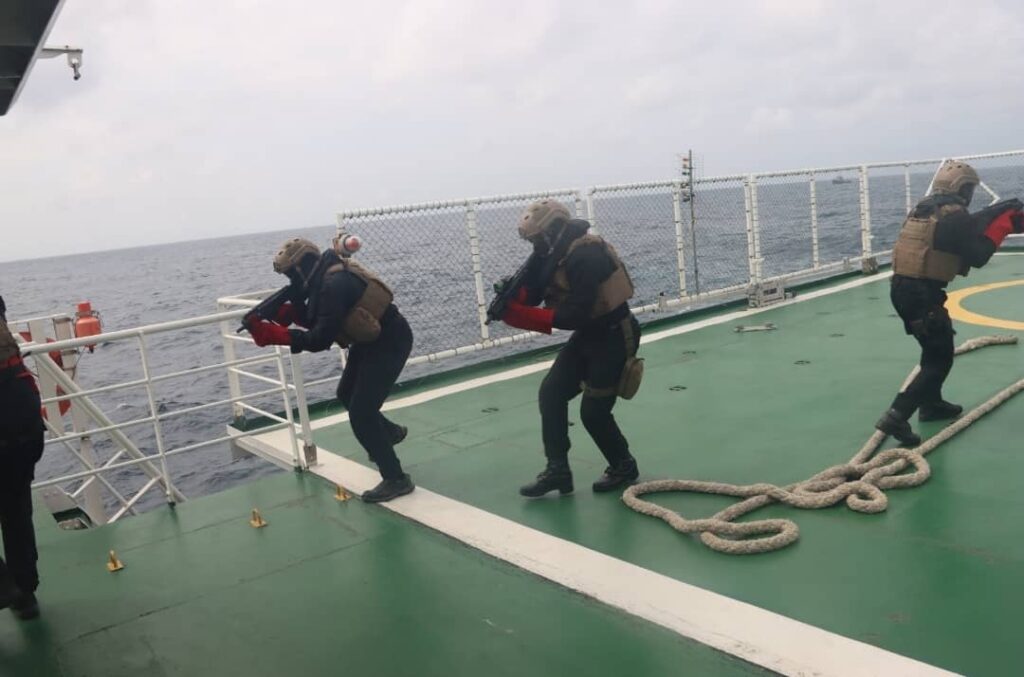ADF STAFF
Once among the world’s hotspots for piracy and trafficking, the Gulf of Guinea still presents a security challenge for the Economic Community of West African States.
The West African regional bloc, also known as ECOWAS, includes 12 coastal countries among its 15 members. It recently conducted Operation Safe Domain III. The third iteration of the ECOWAS maritime security training event launched from Cotonou, Benin, on August 5 and concluded on August 9.
Led by ECOWAS’s Multinational Maritime Coordination Center (MMCC) for Zone E, which consists of Benin, Nigeria and Togo, the exercise included maritime and aerial surveillance, intervention training of operational units, surveys and an exchange of knowledge and research.
MMCC Zone E Director and Nigerian Navy Cmdr. Aniedi Aniedu Ibok kicked off the event, which is part of ECOWAS’s integrated maritime strategy. It was adopted in 2014 to address transnational maritime security challenges and their impact on economic development in the region.
“Faced with the threats of piracy, armed robbery at sea and illicit maritime activities, ECOWAS has decided to mobilize its resources and coordinate its efforts to secure its maritime space,” Ibok said in his opening address. “These threats have significant implications for the economic stability and development of our blue economy. They undermine the potential for economic growth and the livelihoods of our local communities.
“Our response through Safe Domain III reflects our unwavering commitment to neutralizing these threats and creating a secure maritime environment conducive to commerce and trade.”
Ibok also set the agenda and objectives for the exercise and how it fits into the broader plan of the Zone E MMCC.
“The exercise’s objectives are threefold: to combat maritime crimes through equipment, training, and intelligence sharing; to promote information exchange and cooperation; and to create a secure environment for maritime commerce, thereby boosting trade and economic growth,” he said. “The mission of the Center is to strengthen activities aimed at cooperation, coordination, pooling, and interoperability of resources among Zone E Member States.”
Nigerian Navy Capt. Idongesit Udoessien was at the helm of one of four vessels participating in the exercise. Along with helicopters providing air support, the ships patrolled, policed and monitored a total area of 105,746 square nautical miles.
“We have indeed displayed to the world that we can synergize our efforts at sub-regional levels to ensure maritime safety and security in order to ensure a thriving blue economy of the Zone E nations,” he said, according to Nigerian news website This Day Live.
Ibok noted a significant reduction in maritime crime, from 49 reported piracy cases in 2018 to just two in 2023. He attributed this success to coordinated efforts by ECOWAS, member states and international partners.
The European Union, through the Gulf of Guinea Inter-Regional Network project, provided support along with other international partners, including the United Nations Office on Drugs and Crime, the United States, Denmark and Germany.
Nigerian Rear Adm. Mustapha Hassan was pleased to see this year’s exercise build upon the successes of Operations Safe Domain I and II and said security in and around the Gulf of Guinea has improved thanks to the efforts of ECOWAS.
“While we may not be where we want to be yet in terms of maritime safety and security, we have moved past the darkest days when maritime criminals operated in the Gulf of Guinea with impunity,” he said, according to This Day Live.
ECOWAS also announced that Operation Safe Domain IV is planned for March 2025.
“The continued cooperation of our member states is essential to protect our shared maritime heritage and ensure the free flow of global trade,” Ibok said. “Our joint efforts today pave the way for a safer, more secure maritime future in Area E.”

